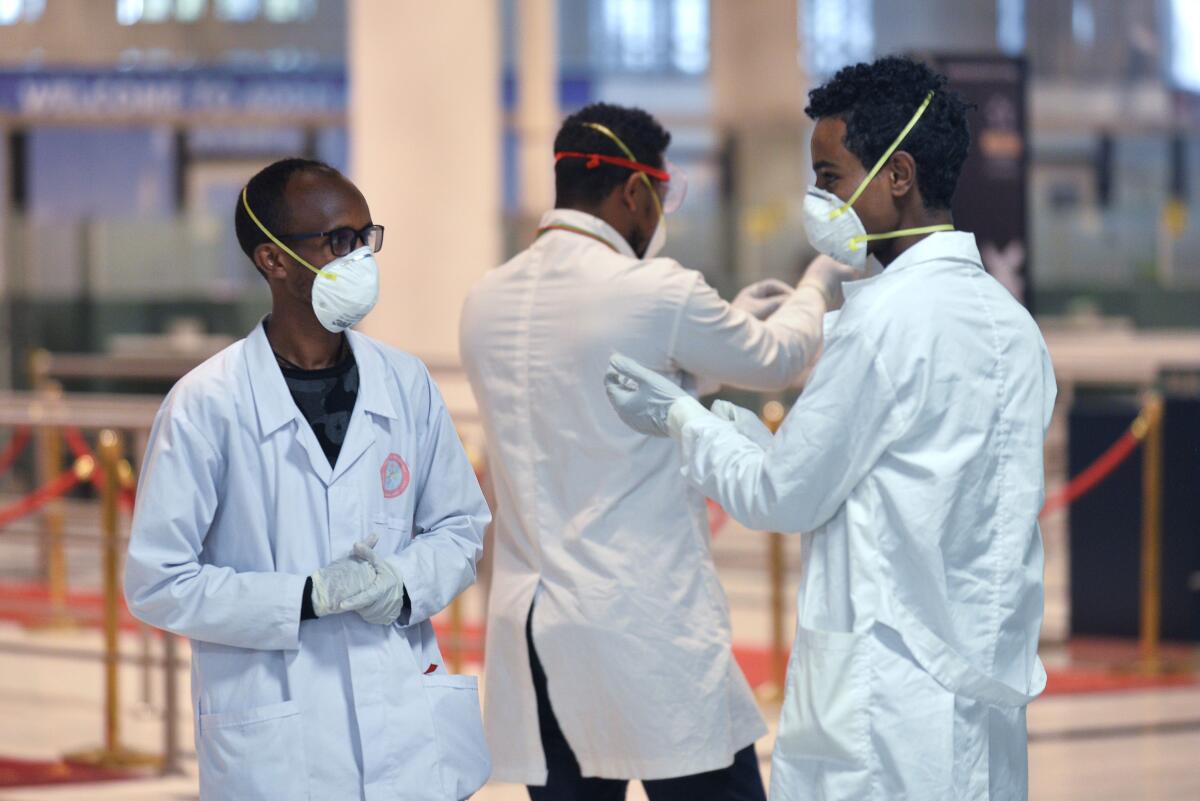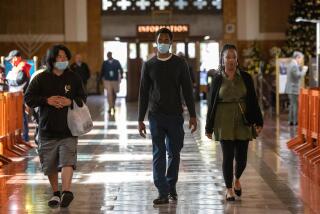Medical report underscores the limits of screening travelers for coronavirus

- Share via
Two German citizens who appeared healthy when they were evacuated from Wuhan, China, in early February were in fact infected with the coronavirus that causes COVID-19 and might have been capable of spreading it to others, according to a medical report released Tuesday.
The findings, published in the New England Journal of Medicine, underscore the limitations of health screenings that have been implemented around the world in hopes of containing the novel virus.
Health officials began screening travelers from China in mid-January, a few weeks after the outbreak began. Those arriving at U.S. airports, for instance, are checked for signs of a fever, cough or trouble breathing to determine whether they require further evaluation in a medical facility.
The two Germans were part of a group of 126 people who flew from Wuhan, the epicenter of the outbreak, to Frankfurt, Germany, on Feb. 1.
Six of the passengers were isolated during the flight because they had symptoms consistent with coronavirus infection. Two other passengers were relatives of theirs who joined them in isolation, and another two were separated because they had been in contact with someone who had tested positive for the virus.
Upon arrival in Germany, those 10 passengers were sent to University Hospital Frankfurt. Throat swabs and sputum samples were tested for a genetic match to the virus using an RT-PCR assay sanctioned by the World Health Organization. In all 10 cases, the tests results were negative.
The other 116 passengers were evaluated by medical personnel at Frankfurt Airport. The travelers’ noses and throats were examined, and their temperatures were taken. They were also asked about a host of symptoms, including muscle aches, coughing, fatigue and diarrhea.
One passenger had a fever of 101 degrees and was taken to the same hospital as the others. Later, that person also tested negative for the coronavirus.
A coronavirus infection can have common symptoms like a cough or fever. There can also be serious problems, including pneumonia or kidney failure.
The remaining 115 passengers were transferred to military quarters in Germersheim for a 14-day quarantine. Although they showed no signs of illness, they were offered a test to see whether they were infected. All but one of them agreed to take the RT-PCR assay.
Two of those 114 travelers turned out to be infected, the results revealed. Officials then repeated the tests and got the same results. The diagnosis was also confirmed with a pair of commercial tests.
Not only were both travelers infected, but the way their samples grew in laboratory dishes indicated that they had the potential to infect others, according to the report.
“We discovered that shedding of potentially infectious virus may occur in persons who have no fever and no signs or only minor signs of infection,” wrote the team led by Dr. Sebastian Hoehl of University Hospital Frankfurt.
That’s the bad news. The good news is that neither of the travelers became very sick. They were admitted to the hospital and thoroughly evaluated, but all that doctors turned up was “a faint rash” and slightly sore throat in one of them.
A week after admission, both patients were well and had no fever, the doctors wrote.
As of Tuesday, more than 73,000 cases of COVID-19 have been confirmed around the world, and 1,875 people have died. There have been 16 confirmed cases and no deaths in Germany,







